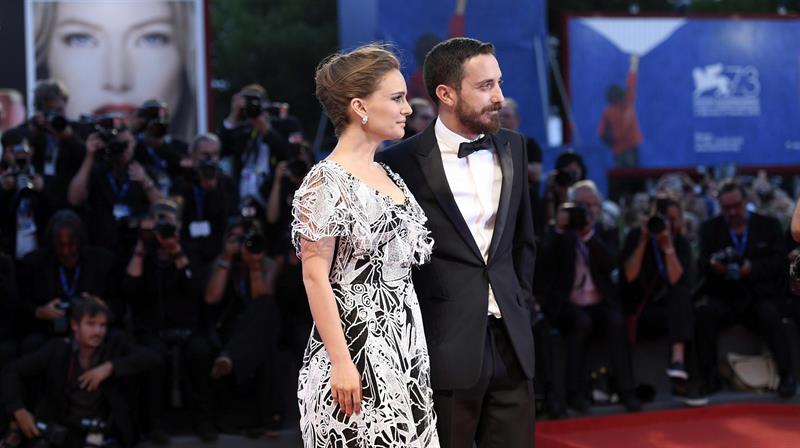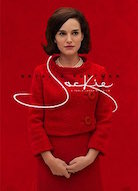Nathaniel R reporting from the NYFF/TIFF as these films played at both fests...

Fortieth birthdays don't get much better than this. In August Chile's most celebrated filmmaker Pablo Larraín turned the big 4-0 just after his excellent new film Neruda opened in his home country. One month later Jackie, his first English language picture, joined Neruda on the international festival circuit to even more excitement. Both are likely and deserving Oscar nominees come January. Pretty good year.
 This turn of events would rather shock 2008 me, scarred by watching Larraín's brutal sophomore effort Tony Manero. That film, his first to really penetrate the international circuit, centered on a homicidal man obsessed with Saturday Night Fever during the Pinochet era. Larraín's subsequent efforts Post Mortem, the Oscar nominated No, and The Club, never lost the aggressive political soul and confrontational fire that characterized that breakthrough. But more and more he's managed to channel that into incrementally more accessible, even warmer films -- though "warmer" is a silly word when describing a room temperature just shy of "freezing."
This turn of events would rather shock 2008 me, scarred by watching Larraín's brutal sophomore effort Tony Manero. That film, his first to really penetrate the international circuit, centered on a homicidal man obsessed with Saturday Night Fever during the Pinochet era. Larraín's subsequent efforts Post Mortem, the Oscar nominated No, and The Club, never lost the aggressive political soul and confrontational fire that characterized that breakthrough. But more and more he's managed to channel that into incrementally more accessible, even warmer films -- though "warmer" is a silly word when describing a room temperature just shy of "freezing."
Certainly Jackie, his most accessible feature since No (which remains his most playful) could not be described as "warm" but that angry fire that can make his films so difficult to watch is also a godsend for this particular story. That fury burns away all the fussiness of the cobwebs of the history picture genre. Larraín's inability to make "easy" pictures complicates this portait of a First Lady in crisis immediately following her husband's assassination in all the right ways. The score by Mica Levy, who gifted Under the Skin with such alien creepiness, is expertly disconcerting and intrusive at strange moments. The gorgeous period costuming only highlights Portman's arch hauteur and the errant blood spoiling the pure color; indeed all the technical aspects from editing to production design serve up something like high-end beauty while also remaining essentially uncomfortable. Rarely has a picture about events 50 plus years in the past felt so immediate and bruising.
And felt so intimate, too. Though many contemporary pictures default to claustrophically tight closeups out of fealty to the phones or laptops that will eventually showcase them rather than storytelling efforts, nothing is less than purposeful in Jackie. When we're not staring all too closely at Natalie Portman's magnificent and excitingly hostile performance -- her fierce steel dares us to think again about the absurd notion that we know this woman due to the familiarity of her image -- Larraín and his cinematographer and production designer trap us alone in empty giant rooms with her or in much smaller places with too many people crowded around her. The only time when this isn't true is in a sequence which is, I'd argue, the film's least successful when Jackie visits with a priest.
If, in the end Jackie is almost too unnerving -- it comes as a relief when it ends (and this is not a knock on the well judged brief running time) -- one senses that the picture would be much poorer if it were anything like an easy sit.
 Neruda is, in its sneaky way, as subversive about its genre as Jackie. Neruda tells the historically true but perhaps not often true story of the famous poet Pablo Neruda (Luis Gnecco) in exile in his own counry in the 1940s when the political tide turns against the Communist party to which he belongs. The government official Videla (Larrain regular Alfredo Castro) hires an officer Óscar Peluchonneau (Gael Garcia Bernal) to hunt down the beloved world famous poet.
Neruda is, in its sneaky way, as subversive about its genre as Jackie. Neruda tells the historically true but perhaps not often true story of the famous poet Pablo Neruda (Luis Gnecco) in exile in his own counry in the 1940s when the political tide turns against the Communist party to which he belongs. The government official Videla (Larrain regular Alfredo Castro) hires an officer Óscar Peluchonneau (Gael Garcia Bernal) to hunt down the beloved world famous poet.
While Neruda is based on a true story (Neruda really being a world famous poet, Communist and political fugitive) and is narrated like so many historical dramas are, Larrain and the screenwriter Guillermo Calderón playfully subvert expectations of the genre from the very beginning. The narration, so often the dullifying bane of well meaning dramas is instead a source of real pleasure. We are introduced to Neruda and his social circles and the political players by Óscar Peluchonneau before we actually meet him. One of the funniest beats that sets the strange but wonderful tone is when Peluchonneau, while describing the party we're watching at the beginning, introduces us to many of the players. When the camera lands on Neruda's wife he simply states "I don't get her."
This immediately reminds you of how literal and expository most narration is in movies and how it's not really going to be that here. Just as Peluchonneau is never quite sure what to make of the man he's chasing (he's often three steps behind Neruda, who isn't even hiding that well and loves to leave him clues) we're never quite sure what to make of Peluchonneau. It's a perfect surreal touch for a story about a man whose voice spoke poetically if not always plainly to millions. And who had to deliver his writing piecemeal and with subterfuge on the run. Gnecco and Bernal don't share scenes in the traditional way but they definitely share the movie with wonderful work, leaning into the comedy of self-regarding artistry without ever losing the pathos.
Is Peluchonneau telling us the truth? Does he even understand the story? Is he the protagonist or merely a sidebar plaything of Neruda's? Peluchonneau may not always know what he's doing and Neruda himself may also lean similarly towards self delusion but Larraín himself is always in control of this strangely funny but ultimately moving historical drama.
Grades: Both films A-?
Oscar Chances: Most definitely. Across the board for Jackie. As for Neruda, if the Foreign Language Film race ever had such things as locks (it doesn't!), I'd be tempted to call this one.